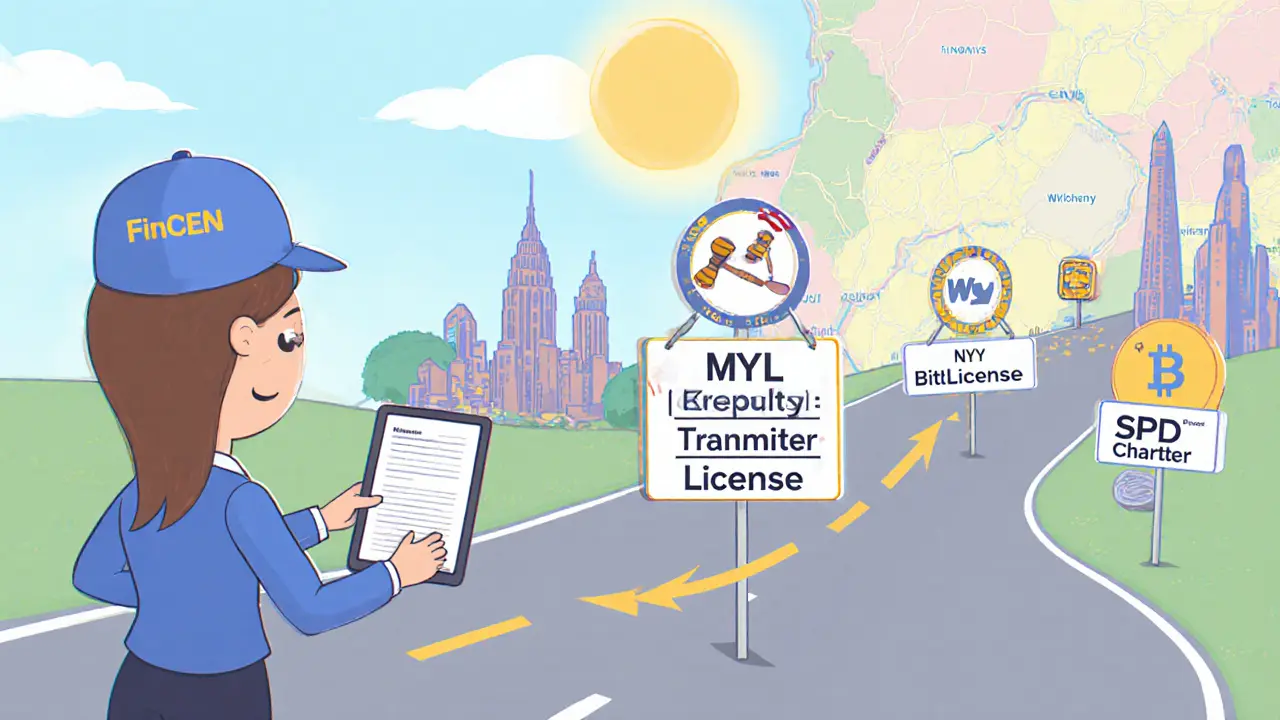Crypto Business Licensing Cost Calculator
Business Information
Cost Inputs
Estimated Licensing Costs
Note: These estimates are based on current regulations. Actual costs may vary based on business model complexity, regulatory changes, and legal fees.
State-Specific Requirements
New York (BitLicense)
$5,000 application fee
$500,000 net worth requirement
180+ day review period
California
$1,500 application fee
$250,000 net worth requirement
90-120 day review period
Wyoming
$750 application fee
Scaled net worth requirement
~90 day review period
Cryptocurrency Business Licensing in the United States is the legal framework that governs how crypto exchanges, custodians, and service providers operate across federal and state lines. If you’re building a crypto exchange, a DeFi platform, or a custodial wallet, you’ll hit a maze of paperwork, capital requirements, and compliance checks. This guide walks you through the core steps, the biggest state differences, and the common pitfalls that can delay or derail your launch.
Why Licensing Matters
Licensing isn’t just a bureaucratic hurdle; it protects your business from money‑laundering exposure, limits legal risk, and opens doors to banking partners. Without a proper license, you can’t legally accept U.S. customers, and most banks will refuse to service you.
Federal Layer: FinCEN Registration
FinCEN is the Financial Crimes Enforcement Network, a bureau of the U.S. Treasury that enforces anti‑money‑laundering (AML) rules. Since the 2013 guidance, any entity that exchanges, transmits, or stores virtual currency is treated as a Money Services Business (MSB) under the Bank Secrecy Act. The registration steps are:
- Create a unique legal entity name that doesn’t infringe trademarks.
- Complete the FinCEN BSA‑E Registration Form online.
- Develop an AML program that covers KYC, transaction monitoring, and SAR filing.
- Maintain records for at least five years and report any transaction over $10,000.
The annual cost of staying compliant typically ranges from $15,000 to $50,000, depending on transaction volume.
State Layer: Money Transmitter Licenses and BitLicense
Every state that requires a Money Transmitter License (MTL) covers businesses that move fiat to crypto or vice‑versa. The requirements differ dramatically:
- New York - BitLicense: Administered by the New York State Department of Financial Services (NYDFS) and applies to any crypto activity that touches a New York resident.. Minimum net‑worth of $500,000, a $5,000 non‑refundable fee, and a 180‑day review period.
- California: Requires $250,000 net worth and a $1,500 fee. The state focuses heavily on consumer protection.
- Wyoming: Offers the most flexible approach with the Special Purpose Depository Institution (SPDI) charter, allowing crypto firms to hold fiat reserves on‑chain. Capital requirements scale with business size.
- Illinois: Exempts pure‑digital entities from licensing, but any fiat gateway still needs an MTL.
On average, a nationwide crypto startup ends up filing for about 32 separate state licenses, costing anywhere from $500,000 to $2 million in total compliance spend.
Comparison of Major State Regimes
| Feature | BitLicense (NY) | California MTL | Wyoming SPDI |
|---|---|---|---|
| Applicable activities | All virtual‑currency services to NY residents | Crypto‑to‑fiat transmission only | Custody & on‑chain settlement |
| Minimum net‑worth | $500,000 | $250,000 | Scaled to business volume |
| Application fee | $5,000 (non‑refundable) | $1,500 | $750 |
| Typical review time | 180+ days | 90‑120 days | ~90 days |
| Ongoing reporting | Monthly AML/CFT filings | Quarterly financial statements | Annual audit, real‑time blockchain reporting |

Step‑by‑Step Licensing Roadmap
- Define your service model. Are you a pure exchange, a custodial wallet, or a DeFi protocol? Your model determines whether you need an MSB registration, an MTL, a BitLicense, or a combination.
- Register with FinCEN. File the BSA‑E form, draft your AML policy, and set up SAR reporting tools.
- Map state requirements. Use a licensing matrix to list every state where you’ll have customers. Identify which states require an MTL versus a BitLicense exemption.
- Secure banking relationships. Banks vet your AML program and capital reserves. Expect multiple rounds of due diligence; many firms partner with crypto‑friendly banks like Silvergate (now under new ownership) or Signature.
- Prepare documentation. Include:
- Business plan and operational flowcharts
- Ownership and beneficial‑owner disclosures
- AML/CFT program and transaction monitoring specs
- Cybersecurity framework (NYDFS Part 500 compliance if targeting NY)
- Financial statements showing required net‑worth
- Submit applications. Pay the non‑refundable fees, attach all documents, and track each state’s portal for status updates.
- Plan for ongoing compliance. Implement automated monitoring, schedule quarterly audits, and stay on top of regulatory updates from the SEC, CFTC, and state agencies.
Most startups spend 6‑9 months preparing before the first application hits a regulator’s desk.
Common Pitfalls and How to Avoid Them
- Underestimating capital reserves. 68% of firms in a 2024 Cornerstone survey missed the net‑worth threshold on the first try. Double‑check each state’s minimum before filing.
- Banking roadblocks. 73% of crypto businesses report difficulty opening accounts. Early outreach to a crypto‑friendly bank and a clear AML policy can shave weeks off the timeline.
- Inconsistent AML documentation. Regulators reject applications that lack transaction‑monitoring logic or SAR filing procedures. Use a compliance SaaS platform that automates rule‑based alerts.
- Ignoring multi‑jurisdictional overlap. New York’s BitLicense applies to any transaction involving a NY resident, even if your server is in Texas. Treat the BitLicense as a de‑facto national requirement if you plan to serve the East Coast.
- Failing to monitor regulatory changes. The SEC’s 2024 crackdown on unlicensed security tokens illustrates how quickly rules shift. Subscribe to the Federal Register and state‑level newsletters.
Special Cases: DeFi, Stablecoins, and Security Tokens
The 2024 FinCEN update clarified that centralized DeFi platforms still need MSB registration when they hold user funds. If your protocol is fully decentralized (no custodial component), you may avoid the MSB label, but you’ll still need to watch for state‑level “money transmission” triggers.
Stablecoin issuers often fall under the OCC’s special purpose charter or state banking regulators. The Office of the Comptroller of the Currency (OCC) issues federal charters for entities that hold stablecoin reserves. Getting an OCC charter can bypass the patchwork of state MTLs, but the application fee tops $100,000 and the audit requirements are strict.
Security tokens are treated as securities by the SEC and must be registered or qualify for an exemption. Simultaneously, the CFTC oversees derivatives, meaning a token that offers leveraged exposure may need an additional CFTC registration. This layered oversight drives many firms to partner with legal counsel that specializes in both securities and commodities law.

Future Outlook: Toward a Unified Framework
The Money Transmitter Modernization Act, moving through Congress in 2024‑2025, proposes a single federal money‑transmitter license that could cut state filings by up to 40%. If enacted, you’ll likely only need to register once with the Treasury and still meet state‑specific consumer‑protection rules.
By 2027, analysts expect 75% of states to have adopted standardized crypto licensing statutes, which should lower compliance costs by roughly 30%. Until then, building a modular compliance program that can be customized for each jurisdiction remains the safest path.
Quick Checklist Before You Submit
- FinCEN MSB registration completed and active.
- All applicable state MTL or BitLicense applications prepared with capital proof.
- AML/CFT policy documented, with SAR filing process tested.
- Cybersecurity controls aligned with NYDFS Part 500 (if targeting NY).
- Banking partner secured and informed of licensing status.
- Ongoing monitoring system in place for regulatory updates.
Frequently Asked Questions
Do I need a BitLicense if I only serve customers outside New York?
Yes, if any of your customers are New York residents, the BitLicense applies regardless of where your servers are located. The NYDFS treats residency as the trigger, not physical presence.
Can a DeFi protocol avoid FinCEN registration?
Only if the protocol is fully decentralized, holds no custodial assets, and does not facilitate fiat‑to‑crypto conversions. Most real‑world DeFi platforms still fall under the MSB definition because they control user funds.
What is the average cost to obtain all required U.S. licenses?
For a mid‑size exchange, total out‑of‑pocket costs range from $500,000 to $2 million, covering legal fees, capital reserves, application fees, and compliance infrastructure.
How long does the BitLicense process take?
Typically 8‑14 months. Delays often stem from incomplete AML documentation or inability to secure a banking partner.
Are there any states that don’t require a money‑transmitter license for crypto?
Illinois exempts pure‑digital entities, but any business that moves fiat into or out of crypto still needs a state MTL. Wyoming’s SPDI charter offers an alternative path for custodial services.
Getting your crypto business licensed in the U.S. is a marathon, not a sprint. Follow the roadmap, budget for both cash and time, and keep compliance front‑and‑center. When you’re ready, the market rewards licensed firms with access to banking, institutional customers, and a clear path to scale.

7 Comments
Jean Manel
Let me guess - you’re one of those guys who thinks ‘compliance’ is just a buzzword until the feds show up at your door with a subpoena. I’ve seen 12 crypto startups burn through $2M in 18 months trying to ‘go legal’ only to get shut down because they didn’t file Form 114 for foreign accounts. You think NYDFS is bad? Try getting a bank account after they flag you for ‘high-risk activity.’ Most of these ‘licensing guides’ are just marketing for compliance consultants who charge $500/hour to tell you what the law already says.
William P. Barrett
There’s a quiet irony here: the U.S. wants crypto to be innovative, but the regulatory structure is designed to make innovation impossible unless you’re already a bank. The BitLicense isn’t regulation - it’s a tax on ambition. Wyoming’s SPDI model is the only real attempt to build a framework that doesn’t punish growth. But even that’s just a workaround. What we really need is a federal license that doesn’t require hiring a team of lawyers just to send Bitcoin to someone in Ohio. The system isn’t broken - it’s deliberately engineered to favor incumbents.
Cory Munoz
I appreciate how detailed this is. Really. I’m just starting out and was drowning in state-by-state info. The table comparing NY, CA, and WY was a lifesaver. I had no idea Illinois exempted pure digital entities - that’s huge for my DeFi tool. Also, the banking part? So true. I reached out to 7 banks before one even replied. They all asked for ‘proof of solvency’ like I was running a hedge fund. I’m not. I’m just trying to build a wallet that doesn’t suck. Keep the guides coming. You’re helping people who don’t have a legal department.
Jasmine Neo
Oh sweet Jesus. Another ‘guide’ for people who think they can ‘disrupt finance’ without understanding that finance exists to prevent chaos. You’re telling me a guy in Texas can build a crypto exchange and think he’s safe because his server’s in Austin? Bro. If a New Yorker uses your platform, you’re under BitLicense. Period. And no, ‘I’m decentralized’ doesn’t mean jack if you’re holding keys. The SEC isn’t stupid. They’ve seen this movie 30 times. If you’re not spending $1.5M+ before launch, you’re either lying or going to jail. Stop romanticizing compliance - it’s the price of not being a criminal.
Ron Murphy
Interesting breakdown. I’m based in the UK and we’ve got our own mess with the FCA, but the U.S. system feels like a regulatory spaghetti junction. The fact that you need 32 licenses just to operate nationally is insane. Wyoming’s SPDI is clever - it’s basically a regulatory loophole that’s actually useful. I wonder if the Money Transmitter Modernization Act will pass. If it does, it’ll be the first time U.S. crypto policy has made sense since 2017. Until then, I’ll just watch from afar and sip tea while you all burn cash.
Prateek Kumar Mondal
This is gold. I'm building a small wallet for Indian diaspora in the US. Didn't know about Illinois exemption. Going to check if my model qualifies. Banking is the real nightmare. Good luck to everyone trying to do this right
Nick Cooney
Wow. A 9-month prep timeline? And you call this a ‘roadmap’? More like a minefield with a GPS that only works in Wyoming. I love how the ‘quick checklist’ assumes you’ve got a legal team and $2M in capital. Meanwhile, I’m a solo dev with a Stripe account and a dream. Also, ‘cryptofriendly banks’? Silvergate’s dead, Signature’s under investigation, and the rest are scared of their own shadows. The real takeaway? Don’t bother. Just move to Switzerland. Or better yet - don’t move. Just code in the dark. The regulators will catch up… eventually. Or not. 🤷♂️